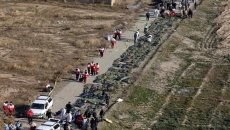OTTAWA - Governments should consider extreme heat a natural disaster as climate change raises the risk of soaring summer temperatures in much of Canada, a new report says.
Irreversible Extreme Heat, penned by experts at the Intact Centre on Climate Change at the University of Waterloo, says "Canadian alarm bells should be ringing" about the risk of intense heat.
"Extreme heat is kind of a disaster waiting to happen," said lead author Joanna Eyquem, managing director of climate-resilient infrastructure at the Intact Centre.
"We have a lot of attention paid to flooding and, and fire obviously, which cause a lot of property damage. But I think that extreme heat is in a different category, and that the cost of extreme heat is people dying and people's health. It's something we don't really have up there with our natural disasters."
The federal government's website on natural disasters provides links to information on earthquakes, floods, wildfires, hail, icebergs, landslides, avalanches, tornadoes, tsunamis, storm surges, volcanic eruptions and winter storms. Heat is not listed, even though it has proven deadlier and more common in Canada than most of those other threats.
The heat wave that hit British Columbia last summer killed nearly 600 people, 526 of them in a one-week span at the end of June. In Quebec in 2018, 89 people died due to extreme heat, most of them in poorer neighbourhoods in Montreal where air conditioning was uncommon and natural vegetation like trees to provide shade was limited.
Ontario has been criticized for failing to properly track heat-related deaths, which are often recorded as a heart attack or due to other chronic conditions, many of which can become quickly fatal when heat hits.
As body temperatures rise it causes a cascading effect to the internal organs, putting stress on the heart, and exacerbating existing conditions. Hot air also leads to poor air quality, affecting people with breathing issues like asthma.
The Intact Centre report says most of Canada will feel the effects of extreme heat by mid-century with southern B.C., the Prairies along the U.S. border, and southern Ontario and Quebec at highest risk.
More than 17 million people live in the urban centres most at risk of extreme heat events, the report said.
Between 1976 and 2005, Windsor, Ont., saw an average of about 25 days above 30 C in a summer. By 2050 that is expected to rise to between 60 and 79 days. In Regina the number of days above 30 C could go from fewer than 20 to more than 50, and in Montreal, from about 10 days to between 35 and 54.
The maximum temperature in Kelowna, B.C., was 35 C between 1976 and 2005. Climate change could push that past 40 C by 2051.
The length of heat waves is also expected to grow, with the average heat wave in Kelowna lasting about six days before 2005, but anticipated to nearly double to more than 11 days by 2051. In Ottawa, heat waves that once lasted an average of five days, could extend past eight days by mid-century.
The longer extreme heat sticks around, the more dangerous it becomes, the report warned.
The report lays out dozens of things individuals, businesses and governments can do to ease the threat posed by extreme heat, including better emergency planning and heat warning notification systems.
People can plant trees for better shade, install window shades, add heat-absorbing building materials, use green roofs or heat-reflecting roofing, and have plans for heat waves that include alternate sleeping arrangements and ensuring friends and neighbours have some place to cool down.
Governments need to incorporate heat concerns into building and city planning codes, have public shade options such as trees or artificial canopies, and make sure there are water-based cooling systems like ponds and sprinklers.
Backup power sources to prevent outages during extreme weather are also critical, the report adds.
"If an extreme heat event coincided with an extended power outage — with no electricity supply to air conditioners and fans — lack of preparedness could result in widespread fatalities," the report warned.
Eyquem said many of the things that can reduce the effect of heat waves will do double duty. For example, trees and parks enhance quality of life, and can also reduce damage from from flooding.






